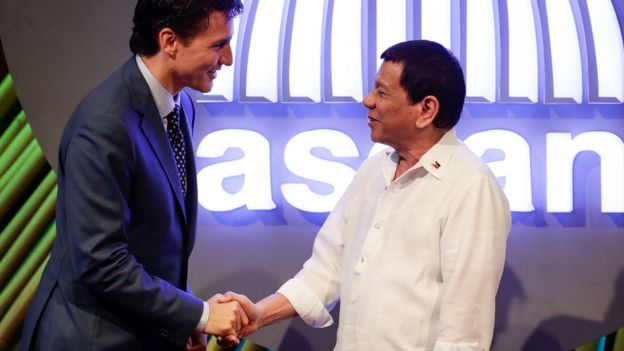Justin Trudeau's Canada: Environmentally Green-Green-Green
"I want a boat prepared. I'll give a warning to Canada maybe next week that they better pull that thing out or I will set sail."
"I will advise Canada that your garbage is on the way."
"Prepare a grand reception. Eat it if you want to."
"Let's fight Canada. I will declare war against them."
Philippine President Rodrigo Duterte

"Currently, a joint technical working group, consisting of officials from both countries, is examining the full spectrum of issues related to the removal of the waste with a view to a timely resolution."
"In 2016, we amended our own regulations around hazardous waste shipments to prevent such events from happening again. We are committed to working collaboratively to ensure the material is processed in an environmentally responsible way."
"[Things are looking good for a resolution within weeks, not months, which] will most probably require Canada to take back the waste."
"Beyond the comments from the president, I don't think there have been any indications that there may be potential diplomatic ramifications. We are very hopeful that's not the case."
Sabrina Kim, spokeswoman, Environment Canada
"It's really the remittance angle [Filipinos living in Canada sending money back to the Philippines], so personal angle, that is the most important and the most vulnerable in the relationship. They [Philippine government] don't want anything upsetting remittance flows."
"[Duterte is being political by] standing up to Canada [rhetorically]. Taking a shot at Mr. Environment, Mr. Global Green Go-To Guy, taking [Trudeau] down a peg internationally isn't the worst thing that could fall into Duterte's lap."
Carlo Dade, trade expert, Canada West Foundation
 |
| Canada's Prime Minister Justin Trudeau shakes hands with Mr Duterte in Manila in 2017 Getty Images |
One hundred and three shipping containers left Canada in 2013 and 2014, ostensibly full of plastics, and labelled thus. When they arrived for recycling, Filipino customs inspectors determined that debris from Canadian trash bins filled the containers, not plastic. Government-to-government, Canada has been persuading the Philippines to dispose of the garbage, over a six-year period of failing to take action. In 2016, a Filipino court ordered the trash returned to Canada. Canada paid no heed.
On trips to the Philippines in 2016 and 2017 Prime Minister Justin Trudeau was specifically asked to settle the matter; Canada had no legal means to force the company that shipped the waste to take it back, he said on the first trip. Then in 2017 he assured the Philippines that Canada was working on a solution; that "theoretically" it was possible for Canada to take steps to reclaim the trash. Possible? "Theoretically"?
The Victoria-based Pacific Centre for Environmental Law and Litigation last week issued a legal opinion that Canada's actions related to the shipments violate parts of the Basel Convention, a treaty preventing countries from shipping hazardous waste to the developing world without the consent of the receiving country. Well, the Philippines consented to no such shipment on their soil or in their waters, but those containers sit there, rotting, toxic materials included.
The Canadian shipping company is no longer in business, having denied sending anything other than plastic to begin with, for what that's worth, and on the evidence, not much. Under the Basel Convention, should an agreement between parties not be feasible, the matter can be taken to the International Court of Justice. Should Canada not act now in good faith and retrieve what should never have been sent to a developing country, this is precisely what the Philippines should do.
 |
Tough-talking, irascible, volatile Rodrigo Duterte has threatened "war" with Canada. One of the issues mentioned and promised during his campaign for election to the presidency was that the stinking pile of trash would finally be removed, at his insistent overtures to the government of Canada. The issue is one that infuriates Filipinos and with good reason; no nation appreciates another, more developed and wealthy nation treating their own as a trash receptacle.
The Philippines exports $1.3 billion in trade goods to Canada, double the $626 million Canada exports to the Philippines, There are also over 558,000 Filipino-Canadians, born in the Philippines and emigrated to Canada to become landed immigrants and citizens; an insult to the Philippines is an insult to that Canadian demographic of hard-working, tax-paying people. Those Philippine-born Canadian residents send back to their original country of residence $1.2 billion in remittances.
"This case is garnering so much attention because it’s an example of what the environmental justice movement has been saying for a long time — pollution flows according to a power gradient, from the most powerful to the least powerful."
“It’s on us, really. It’s our garbage, it’s poisoning people around the world and now it’s on us to fix."
Dayna Scott, associate professor, environmental law, Osgoode Hall Law School, York University
 |
| Officials check a shipping container holding garbage from Vancouver in Manila in this undated, handout photo. (Philippines Bureau of Customs/Canadian Press) |
Labels: Canada, Controversy, Environment, Philippines, Trash
0 Comments:
Post a Comment
<< Home